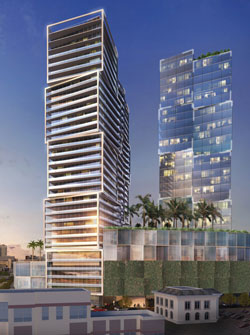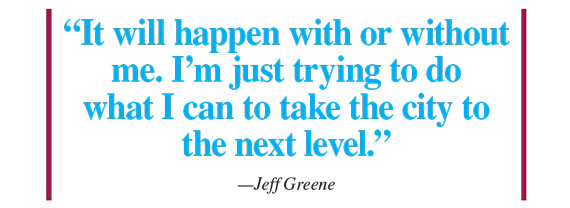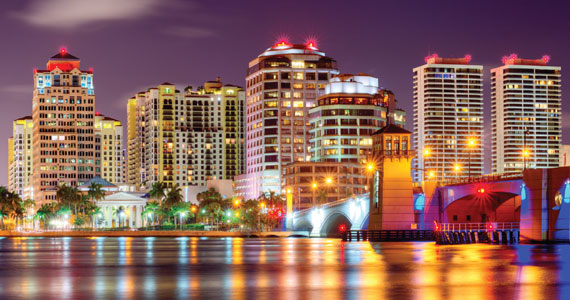The big short is getting a lot taller. Billionaire real estate mogul Jeff Greene made hundreds of millions of dollars betting against subprime mortgage-backed securities before the last financial crisis hit. He now owns more than 75 acres of prime land in West Palm Beach — a city poised for major growth — with plans to build several new high-rises there.
“People talk about disruption in various industries, like what Amazon is doing in retail,” the 61-year-old investor and developer told The Real Deal from his desk in a former post office on North County Road. “I think it’s very easy to disrupt West Palm Beach.”
Greene is now working to bring thousands of residential units, a hotel, a 30-story office building, a raft of retail space and even a new school to the South Florida city with more than 100,000 residents and plenty of affluence in and around it.
“Sitting in my private plane at the airport it struck me that there were 300 to 400 other private jets there,” he said. “How can a city with this much wealth and education have so few amazing buildings, restaurants and hotels?”
But that’s already starting to change, Greene noted, citing the renovation of the world-class Norton Museum of Art, the construction of a new baseball stadium to host spring training for the Houston Astros and Washington Nationals, the wild success of the Palm Beach Outlets mall and the construction of the All Aboard Florida train line that will run from Orlando to Miami, with stops in Fort Lauderdale and West Palm.
“Hopefully some of the things I’m planning to do will be world class for this community,” the husband and father to three young children said. “It will happen with or without me. I’m just trying to do what I can to take the city to the next level.”

One West Palm
Greene emphasized that he wants his projects to help not only those who already live here, but also to attract job creators from other cities, including New York and Los Angeles, where he also invests. His first purchase in West Palm Beach was two-and-a-half acres in the city’s bohemian Northwood Village in 2010.
“I figured it would just be a land bank,” he noted. But as he looked at other properties, Greene said he found incredible bargains and had no problem amassing his holdings. “There were no other buyers because cycles are so severe that in a crash market hardly anyone has money, and those who do get nervous,” he said.
The feisty developer said he was able to buy the stalled Cameron Estates apartment project, which is located about a mile from downtown and previously had a $60 million loan attached to it, for just north of $6 million. That development is now close to completion, with more than 170 of its 548 units already rented.
Greene’s biggest priority going forward is his One West Palm project at 550 North Quadrille Boulevard, he said. The planned $250 million development, designed by Arquitectonica of Miami, will take up an entire block and include two 30-floor towers that look like stacked blocks.
The ground floors will contain shops, restaurants and corner parks, as well as a day care center and a fitness center with indoor and outdoor tennis courts. One tower will include 340,000 square feet of Class A office space, and the other will include a five-star hotel with 209 guest suites and 84 luxury condo or rental units above that.
The city approved the plan in January and Greene hopes to break ground in three to six months. He said he will finance the development with his own equity and a bank loan and that he’s not taking on any partners in the deal.
The roughly 830,000-square-foot project has drawn mixed reactions so far. Local developer Nader Salour, the sole principal of Cypress Realty of Florida, said he views One West Palm as a boon for the area. “It’s a much-needed addition to the city,” said Salour, who just completed a 259-unit apartment building a few blocks away from Greene’s development site.
But others noted that while West Palm Beach is in need of additional high-end office space, 340,000 square feet a few blocks from downtown, and bordering a gritty neighborhood, may be a bad equation.
“There is certainly no market for that much office space,” said one prominent West Palm real estate lawyer who spoke on the condition of anonymity to avoid upsetting his clients. “You better have a 200,000-square-foot user. I don’t see that many people finding that location so desirable.”
Jonathan Gladstone, who also owns commercial property in the area, said Greene might be better off doing smaller downtown developments first, given the scope of One West Palm. “Jeff is brilliant in his investments, but that’s a colossal project,” Gladstone told TRD. “The issue is absorption: Can the market handle that much footage?”

The Cameron Estates apartment complex is near completion, with nearly a third of its 548 units rented.
Gladstone said that since Greene has only five full-time workers at his office, the developer needs either a joint-venture partner or a bigger staff to pull it off.
Greene, however, said it doesn’t make sense for him to bring more people on board for his projects. “If I had a staff of 100 people in the office dependent on deal flow and promotions, I would be in the office until 7 p.m.,” he said. “I wouldn’t be doing this much. I would [only] be managing.”
The lean corporate structure gives him the opportunity to hire the best construction managers, property managers, hotel managers and other employees on a contract basis, Greene said. And though it costs more money to do so, it’s worth the expense, he added. “If I hired people in-house for those jobs, I wouldn’t get the same level of expertise,” Greene said. “I can pick and choose among the best companies.”
Neil Merin, chairman of the commercial real estate brokerage NAI/Merin Hunter Codman, said Greene’s small office team is both a blessing and a curse, given that the developer is working on more than five projects now.
“It’s good in that he’s hands-on,” said Merin, who has brokered the sale of properties to Greene. “But it’s a detriment to have a slim staff when you’re trying to do a lot of things at once. There’s only so much you can do yourself.”
Still, Greene’s copious wealth gives him added flexibility, Merin said. “He doesn’t have to focus on a single project like others” who are beholden to their partners and lenders, Merin explained. “For them the clock is ticking, but not for Jeff Greene.”
Greene — who is now worth more than $3 billion, according to Forbes — grew up in a middle-class neighborhood in Worcester, Mass., where his father struggled with a business selling textile machinery. His family moved to West Palm Beach in 1970 after his father lost the business. Greene stayed up north to finish high school but gained exposure to West Palm on his visits during school breaks. He even worked as a busboy at the famed Breakers hotel.
He put himself through Johns Hopkins University in two-and-a-half years by working odd jobs that included teaching at a Hebrew school and selling circus tickets. Greene saved $100,000 managing telemarketing centers, which he then put into a three-family house in Somerville, Mass., outside of Boston. He lived in the home while earning an M.B.A. at Harvard University and during that time amassed a portfolio of 17 more homes in the city.
 After finishing business school, Greene headed to Los Angeles and began buying low-end apartment buildings, borrowing heavily to do so. He said his net worth rose to $35 million, but he lost pretty much all of it in the savings and loan crisis of the early 1990s. Still, he rebounded later in the decade, growing his net worth to $700 million with a portfolio of 7,000 apartments.
After finishing business school, Greene headed to Los Angeles and began buying low-end apartment buildings, borrowing heavily to do so. He said his net worth rose to $35 million, but he lost pretty much all of it in the savings and loan crisis of the early 1990s. Still, he rebounded later in the decade, growing his net worth to $700 million with a portfolio of 7,000 apartments.
In Los Angeles, Greene turned into a jet-setter, acquiring a plane and a 145-foot yacht (though he has since downsized to a 32-foot motor boat). The real estate mogul quickly gained a reputation as a partier, hanging out with Mike Tyson, the best man at Greene’s wedding, as well as Paris Hilton and Lindsay Lohan. The former madam Heidi Fleiss was once a roommate of his. Greene pointed out that his circle of friends also includes George Soros, Itzhak Perlman and Oliver Stone.
But not all of his celebrity connections have worked out well. Greene and star director Ron Howard sued each other after Howard became unhappy with a ritzy home he rented from Greene in Brentwood. In the end, Greene had to pay Howard $616,000.
Still, Howard’s complaints about the property were trivial, Greene said, and the result was “a tremendous miscarriage of justice.” He noted that soul singer Diana Ross was perfectly happy living in the home before the Hollywood director moved in. “The moral of the story is don’t go into a lawsuit against a popular celebrity,” Greene said.
The billionaire magnate had a much closer and more profitable friendship with hedge fund heavyweight John Paulson, the head of Paulson & Co., but that relationship also went south. In early 2006, Greene started to worry about the frothiness of real estate values and talked to Paulson to see how he could hedge against a potential loss in his empire of Los Angeles apartment buildings.
Paulson broached the idea of betting against subprime mortgage bonds with credit default swaps. Instead of investing with Paulson’s fund to execute that strategy, Greene did it on his own and ultimately scored $800 million, which led to Paulson’s mistrust. The two investors remain cordial but are no longer close friends, Greene said, noting that the dispute was the result of a misunderstanding.
By 2007, the real estate mogul was ready for a new phase. He married Mei Sze Chan, 19 years his junior, who ran her own real estate business in Mountain Dale, N.Y. The couple transplanted to Miami and later Palm Beach, where they built an estate on the ocean for themselves and their three children. That was the right time for Greene’s foray into West Palm Beach.
“I had almost $1 billion in liquid assets and was looking for investments,” he said. “I did some searching around Miami in 2008, but there was little to be had.”
Troubled properties were still in a state of flux, and Greene said he couldn’t find deals. But by 2010, lenders were finally getting properties back and disposing of them. “Prices were depressed,” he said. “I knew they would come back.”
In addition to buying and selling real estate, Greene has also tried his hand at politics on more than one occasion over the years. He ran unsuccessfully for the Republican nomination in a U.S. congressional race in Los Angeles in 1982. And he later failed in a bid for the Florida Democratic Senate nomination in 2010. Those political aspirations stemmed from a desire to help make people’s lives better, according to the developer, who is now a registered Democrat.

Greene’s vision for West Palm Beach could take up to 10 years to complete
“I spent a lot of money and I learned a lot,” he said. “Of course it would have been nice to win. But I don’t know how happy I would have been in the Senate. It’s an increasingly dysfunctional institution. I will accomplish a lot more in the private sector and through philanthropy.”
Some of the people who have worked for Greene on a contract basis over the years have complained that he is too demanding and discards them like yesterday’s lunch. But Greene defended his management style. Not every worker is a good fit, he said, but those who seek to advance themselves have done just fine under his leadership.
“I can’t say I’m always in a mellow mood, but I’ve had the same lawyer and the same accountant for more than 30 years,” he said. “I never ask workers to do what I don’t. I tell them to go home at 6.”
Yet even with his steadfast work ethic, Greene said it will likely take up to 10 years to complete all of his current projects in West Palm Beach. This fall, the developer plans to open his private primary school there, to be called the Greene School, with an emphasis on what he calls “STEAM”: science, technology, engineering, the arts and math.
He boasted that it could become one of the top schools in the world and help convince corporate executives to move their companies here, knowing that their children will get a great education.
The school is the cherry on the sundae for Greene. While he still owns properties in New York and Los Angeles, West Palm has become the center of his universe. After that he’s not looking for another act, he noted.
“This is it, I’m 61,” Greene said. “I would never look elsewhere in Florida. I know the brokers here, they know me and I can affect the market. I’m all in on West Palm Beach.”
